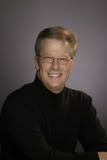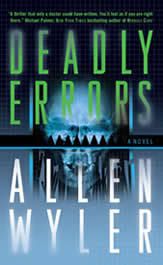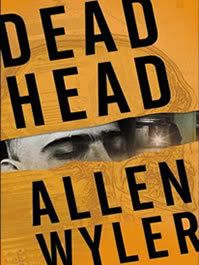AUTHOR INTERVIEW: Allen Wyler
By Kathleen Bolton | September 5, 2008 |
 Neurosurgeon and successful entrepreneur Allen Wyler had always been a long-time fan of thrillers. In 2005, he decided to follow his yen and try his hand at fiction. The rest, as they say, is history. His debut thriller DEADLY ERRORS garnered raves in a crowded genre. Laced with authentic ER detail and the ability to distill medical jargon into readable prose, Wyler’s medical thriller wowed the crime fiction community. His followup effort, DEAD HEAD, was equally successful and established Wyler as an author on the same par as Tess Gerritsen and Michael Crichton.
Neurosurgeon and successful entrepreneur Allen Wyler had always been a long-time fan of thrillers. In 2005, he decided to follow his yen and try his hand at fiction. The rest, as they say, is history. His debut thriller DEADLY ERRORS garnered raves in a crowded genre. Laced with authentic ER detail and the ability to distill medical jargon into readable prose, Wyler’s medical thriller wowed the crime fiction community. His followup effort, DEAD HEAD, was equally successful and established Wyler as an author on the same par as Tess Gerritsen and Michael Crichton.
Wyler writes in the best of thriller tradition: hella-quick pacing, stripped prose, plot-twists you never see coming. I ripped through DEADLY ERRORS in two days, riveted by the story of an everyman surgeon trying to clear his name.
With DEADLY ERRORS now in paperback release, Wyler is fielding movie offers for his novels and is hard at work on his third title.
Enjoy our our interview with Dr. Allen Wyler.
Q: As a successful neurosurgeon, what made you want to take the plunge and write thrillers? Are there any similarities to the creativity that writing novels demands and the skills it takes to do brain surgery?
Allen Wyler: The practice of medicine, in particular neurosurgery, doesn’t leave a lot of room for creativity. I think many physicians have a creative drive and choose to express it in one of the arts. Mine happens to be writing. I love the process of coming up with an idea and then hammering it into a viable story. The only similarity I can see between neurosurgery and writing is both take discipline and patience.
Q: What is your writing process like? Do you plot extensively or let the plot evolve organically?
AW: For me a good thriller is heavily plot driven because of usually requiring numerous “twists and turns.” (No question, good characters are essential also.) My approach to putting a story together is to first define the beginning and how I want it to end. Once that’s done, I connect those two points with an outline so I can see the story’s logic. Then I begin writing. As I go along, questions always pop up I never would have predicted and I go back and incorporate them into the outline or what I’ve already written. This method happens to work best for me.
Q: Have you ever gone down a blind alley and been forced to re-plot your novel? What do you do if you get stuck?
AW: Not a complete dead end, but I have had to make significant changes. I’m going through that right now.
Half way through I realized a need to change an entire sequence of events. The rest of the story except for several chapters will stay the same. I believe a good outline will eliminate complete dead ends before you find yourself writing into one.
Q: Your medical thrillers are steeped in the gritty details of surgery and hospital politics. How do you know where to draw the line in providing the reader technical detail that could overwhelm them? Are there any tricks you can share to making the scientific world of medicine accessible to the average person?
AW: Tough question to answer. Too much detail will bore the reader. Not enough will make the story appear superficial. I believe neurosurgery is shrouded in a mystique and many people would like to know what it is like from an insider, so I take the reader into the operating room to experience surgery as I have. Some readers choose medical thrillers specifically because of an interest in medicine, so “gritty” is in the eye of the beholder. The trick is to present material in an understandable and palatable way without lecturing. Michael Crichton is a great example at walking this sometimes difficult line.
 Q: You set DEADLY ERRORS, your first novel, in Seattle, your hometown. Does place inform your plot choices?
Q: You set DEADLY ERRORS, your first novel, in Seattle, your hometown. Does place inform your plot choices?
AW: I picked Seattle because I know the city well and could use some neat places, like the old underground Seattle. It also seemed a good location because of Microsoft and several other computer-related companies are here. The story could have well taken place in just about any major city. My second thriller, DEAD HEAD, takes place in Bethesda, MD on the NIH campus.
Q: The plot for DEADLY ERRORS explores the intersection between medicine and computerized administration of hospital records, and the doctors and patients caught in between. Why did you choose to explore that conflict? Are medical record screw ups more prevalent than we thought?
AW: In November 1999, the Institute of Medicine (IOM) concluded a study entitled, To Err Is Human: Building A Safer Health System. It focused attention on the issue of medical errors and patient safety by reporting that as many as 44,000 to 98,000 people die in hospitals each year from preventable medical errors. This makes preventable medical errors this country’s eighth leading cause of death — higher than motor vehicle accidents, breast cancer, or AIDS. The use of computerized medical records is dramatically lowering the rate of mistakes and improving the health care delivery system. To me it was an interesting topic to explore.
Q: And pretty scary for the reader to contemplate. Is the “scare factor” or a plausible “what-if” hook key to a gripping thriller?
AW: For me, plausibility is essential for a good thriller. I’ve tossed books I thought were totally insane or exceeded the limits of plausibility. The story should be written so the reader is afraid, not for themselves, but for the protagonist (because they care about her). One difference between a mystery and a thriller is that in a mystery the protagonist is hard at work solving a problem. In a thriller, the protagonist is hard at work saving herself. There has to be something huge at stake. James Bond, for example, is usually saving the world as well as his own life.
 Q: DEAD HEAD, your follow-up novel, is about a neurosurgeon forced to keep a terrorist’s severed head alive. How in the world did you come up with that?
Q: DEAD HEAD, your follow-up novel, is about a neurosurgeon forced to keep a terrorist’s severed head alive. How in the world did you come up with that?
AW: My editor at the time, Natalia Aponte, suggested it. Because of my experience with brain/computer interfaces I thought it was a mind-blowing (no pun intended) subject. Interestingly, the science in this novel is not science-fiction.
Q: Did she let you roll with the idea on your terms? Was it daunting to take someone else’s idea and make it your own?
AW: I think she said something like, “And you’ll have to make it someone very important, like maybe the President of the United States.” I wrestled with that one for weeks but just couldn’t make it work. So I changed it to a terrorist. It was such a cool idea – keeping a brain alive for the information it contained – that it was easy to build a story around.
Q: Thrillers are a pretty reliable staple of the genre fiction market. What should writers be mindful of when targeting this genre?
AW: It’s an incredibly competitive genre. Last year I judged for the International Thriller Writer Best Novel Award. Each judge received in excess of 300 hardcover thrillers published in 2007. First novels and original paperbacks were excluded from this category, so you can see this isn’t a complete list of all thrillers published that year. That’s about 25 new thrillers coming out each month. As an author, that’s pretty daunting.
Q: What are some things aspiring thriller writers can do to break out of the pack? Are there any trends in this genre that you’ve observed?
AW: Do the hardest thing possible – find a huge “WOW” factor for your story. Easy to say, right? Hard to do. Find something original and don’t default to another outcast alcoholic FBI profiler living in Duluth or another De Vinci Code knock off. I’ve see too aspiring writers simply rehash of the same dog-eared stories. Force yourself to reject the first idea that pops into your mind because that’s probably the easiest (after all, that’s why it came to mind) but it’s not going to have the WOW factor.
Q: DEAD HEAD is being considered for movie adaptation. Can you tell us anything about this?
AW: All I can say at this time is a major studio is looking at the work. Whether the story will ever be made into a feature length film is yet to be determined. I sure hope so.
Q: What was the best advice you received in this business? The worst?
AW: The best advice as to believe in yourself and don’t let rejection get you down. The first is the easier of the two. I can’t recall the worst advice.
Q. Tell us about your upcoming projects.
AW: My agent is presently shopping around CHOP SHOP, a thriller about the huge black market in cadavers and cadaver body parts.
Allen Wyler’s books are currently available at online retailers and bricks n’ mortar stores everywhere.









dead heads, chop shops, and HIPAA run amok! how delightful! thanks for a great interview, again, WU!
Thoroughly enjoyed the interview — loved the books, and am hoping to see DEAD HEAD as a movie. Also am looking forward to more books in this genre from Mr. Wyler. Thank you.
His process (with the outlines) sounds like mine, so that’s definitely reassuring.
Dead Head sounds like an awesome idea! I’d totally go see that.